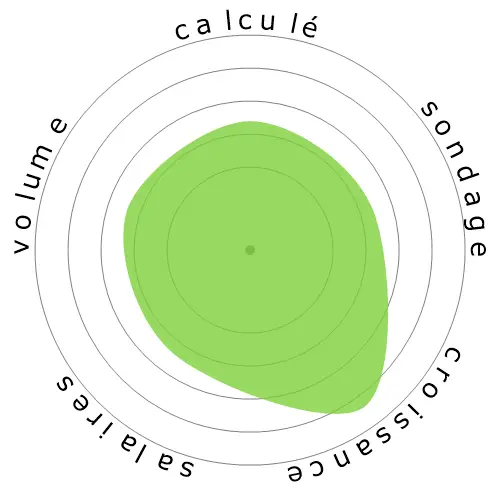Agents de bord




Les gens ont également vu
Risque d'automatisation calculé
Risque Faible (21-40%) : Les emplois à ce niveau présentent un risque limité d'automatisation, car ils nécessitent un mélange de compétences techniques et centrées sur l'humain.
Plus d'informations sur ce que représente ce score et comment il est calculé sont disponibles ici.
Sondage utilisateur
Nos visiteurs ont voté qu'il y a peu de chances que cette profession soit automatisée. Cette évaluation est davantage soutenue par le niveau de risque d'automatisation calculé, qui estime 38% de chances d'automatisation.
Que pensez-vous du risque de l'automatisation?
Quelle est la probabilité que Agents de bord soit remplacé par des robots ou l'intelligence artificielle dans les 20 prochaines années ?
Sentiment
Le graphique suivant est inclus chaque fois qu'il y a un nombre substantiel de votes pour rendre les données significatives. Ces représentations visuelles affichent les résultats des sondages utilisateurs au fil du temps, fournissant une indication significative des tendances de sentiment.
Sentiment au fil du temps (annuellement)
Croissance
On s'attend à ce que le nombre de postes vacants pour 'Flight Attendants' augmente 9,9% d'ici 2033
Emploi total, et estimations des offres d'emploi
Les prévisions mises à jour sont attendues 09-2025.
Salaires
En 2023, le salaire annuel médian pour 'Flight Attendants' était de 68 370 $, soit 32 $ par heure.
'Flight Attendants' ont été payés 42,3% de plus que le salaire médian national, qui était de 48 060 $
Salaires au fil du temps
Volume
À partir de 2023, il y avait 126 020 personnes employées en tant que 'Flight Attendants' aux États-Unis.
Cela représente environ 0,08% de la main-d'œuvre employée à travers le pays
Autrement dit, environ 1 personne sur 1 mille est employée en tant que 'Flight Attendants'.
Description du poste
Surveillez la sécurité de la cabine de l'avion. Fournissez des services aux passagers de la compagnie aérienne, expliquez les informations de sécurité, servez de la nourriture et des boissons, et répondez aux incidents d'urgence.
SOC Code: 53-2031.00


Commentaires
Leave a comment
Plus, robots can't do such things as CPR or use a first aid kit, for example. So, it's pretty risky.
And by the way flight attendants are there to save u not to make u happy.
First priority is safety the If it’s possible the service time will come.
Given the recent horrific experiences passengers had to endure from these "flight attendants", I see machines replacing these incompetent humans in the future. It'll save the airlines plenty of revenue and avoid lawsuits and having to pay these poorly trained service attendants for mediocre to dismal services provided.
The only ones to blame would be the flight attendants themselves, because a machine did a better job than they ever would.
For example,
Today : 10 human flight attendants
Future: 1-3 human flight attendants, 7+ robot flight attendants.
Capish? :P
I have witnessed a decline in the manners and decorum of the passengers traveling. Possibly, the added stress to passengers of airport safety procedures has taken a toll on their nerves. I remember when friends and family could accompany passengers to the gate. Now, the seats are packed in like sardines in a can.
Airline competition made the way for no-frills service and more passengers in smaller seats on airplanes. This has taken a toll on everyone's stress levels. Still, I see friendly FAs who are doing their best to accommodate everyone onboard and assuage those who are already frazzled by the time they take their seats.
A robot may make the dispersion of in-flight commodities easier but it can never take care of all of the emergencies that FAs are trained to handle, the medical emergencies, the duplicate and other seating problems, the myriad of human interactions that FA's handle, unaccompanied children, wheelchair passengers, interaction with cockpit and ground staff, etc., etc. the list goes on, not even considering a major emergency like a hijack incident.
You have vastly underestimated the uber-selective hiring, initial and ongoing training that FAs have. Did you know that they have to take FAA-mandated emergency testing yearly on every airplane which they are qualified to work and pass the test with a 90-100% grade. This includes physical testing in airplane simulators., first aide, resuscitation and cardio procedures etc.
If you see an FA behaving in the unprofessional manner you have described, you should write a letter to the airline about that employee.
Laissez un commentaire sur cette profession